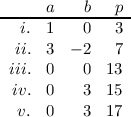
YALE UNIVERSITY
DEPARTMENT OF COMPUTER SCIENCE
| CPSC 467: Cryptography and Computer Security | Handout #8 | |
| Professor M. J. Fischer | October 23, 2017 | |
Homework Assignment 6
Due on Monday, October 30, 2017.
Problem 1: Elliptic curve parameters
Consider the elliptic curve with parameters a, b, and p defined by

For each parameter triple (a,b,p), say whether or not the resulting elliptic curve satisfies the definition for an elliptic curve modulo a prime given on slide 10 of lecture 13, and explain your answers.

Problem 2: Elliptic curve group
List all points in the elliptic curve group defined by

Problem 3: Elliptic curve addition
The points P = (0,3) and Q = (4,2) are in the elliptic curve group defined by

(See slide 14 of lecture 13.) What is P + Q? Show your work.
An element a ∈ Zn -{0} is said to be a zero divisor modulo n if ab ≡ 0 (mod n) for some b ∈ Zn -{0}.

In all cases, justify your answers.
Problem 5: Greatest common divisor
The definition of greatest common divisor can be extended naturally to a sequence of numbers (a1,a2,…,ak), not all of which are zero; namely, it is the largest integer d ≥ 1 such that d∣aj for all j = 1,2,…,k. Describe an efficient algorithm for computing gcd(a1,…,ak), and explain why it computes the correct answer.
Problem 6: Euler’s totient function
Compute ϕ(3500). Show your work.
Compute 3907211 mod 3500.
Problem 8: Extended Euclidean algorithm
Use the extended Euclidean algorithm to solve the Diaphantine equation  . Show the
resulting table of triples as in slide 15 of lecture 14 notes.
. Show the
resulting table of triples as in slide 15 of lecture 14 notes.
[Note: You may write a program to produce the table if you wish, but these numbers are small
enough to make it quite feasible to carry out the computation by hand or with the aid of a pocket
calculator.]